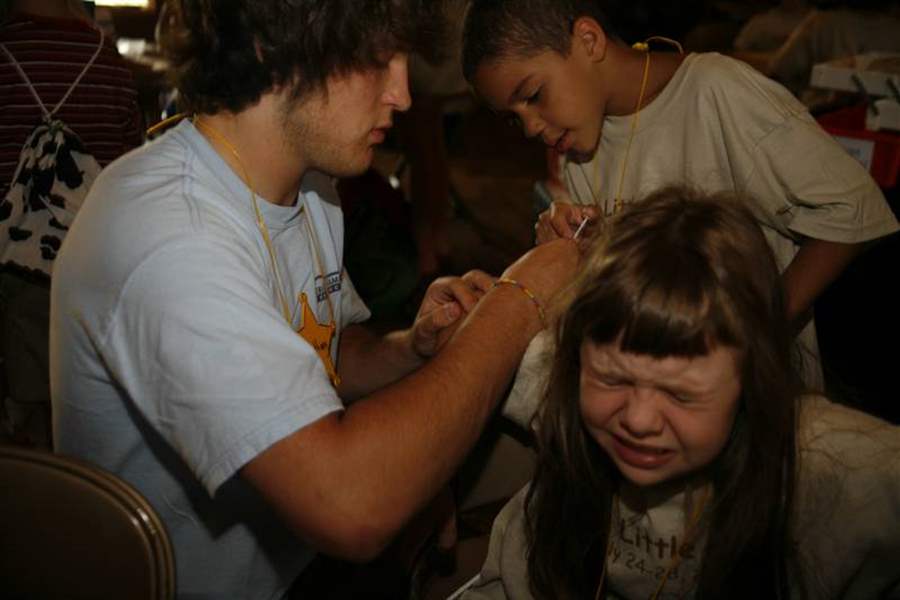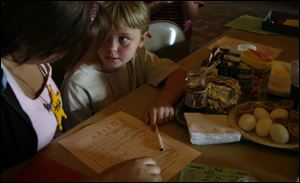
Camp helps children handle their diabetes
7/26/2006
Anthony Pacholek, left, and Kory Warren give Rose Berry an injection of insulin for her diabetes as part of a day camp for kids with the Type 1 version of the condition. The camp is a service of Diabetes Youth Services based in Toledo.

Anthony Pacholek, left, and Kory Warren give Rose Berry an injection of insulin for her diabetes as part of a day camp for kids with the Type 1 version of the condition. The camp is a service of Diabetes Youth Services based in Toledo.
Emmalee Halleck wears a look of concentration as she carefully draws insulin from a small bottle into a syringe.
The 9-year-old doesn't even flinch as she sticks the needle into her thigh and shoots the clear liquid into her body.
"I get to do two shots in the morning, one at lunch, and one at dinner," she said.
Four and a half years ago, Emmalee, of Bowling Green, was diagnosed with Type 1 diabetes. On any normal morning, she may be the only one testing her blood sugar and giving herself shots. But this week at Olander Park in Sylvania, she has 28 other 6 to 9-year-old companions in arms at Little Shots Day Camp.
The camp is a service of Diabetes Youth Services, based in Toledo. The group is one of the only ones focused on providing services for young diabetics, as opposed to researching to find a cure. Campers come from Wood, Ottawa, and Lucas counties in northwest Ohio, as well as Monroe, Lenawee, and Clinton counties in Michigan.

Alexis Bailey, 7, looks to Elizabeth Gilda for advice with her food list.
When the camp started Monday, Director Robin Cordon asked everyone who had diabetes to stand up. Nearly everyone in the room got on their feet.
"It was kind of an 'Aha!' moment for the kids," said Marcia Hoeck, board chairman of Diabetes Youth Services.
"They realize they're not the only one for once - they're in a group where they all understand one another," added Becca Gorman, president of the Junior League, which co-sponsors the program.
The children really aren't alone - Diabetes Youth Services estimated in 1996 that about 3,000 children in the Toledo area are living with diabetes, a figure that is probably more like 4,000 or 5,000 today, said Ms. Cordon, a registered nurse.
"Cases of Type 1 diabetes are increasing dramatically," she said. She said explanations as to why are complicated, but one reason is Toledo's winter climate lends itself to viruses that can trigger the disease. "There are actually four or five different things that need to come together for someone to develop Type 1 diabetes," she said.
There is no good way to prevent the disease, and no cure.
For many kids with diabetes, this is their only chance at the seemingly simple experience of summer camp, said camp ambassador Margot Estes, who has a 7-year-old son attending.
"It was very hard yesterday morning for some of the parents to leave their kids," she said. "A couple of moms were in tears - it's scary because a lot of things can happen."
People with Type 1 diabetes need to constantly monitor their blood sugar, keeping it in a healthy range through a delicate balance of food, exercise, and insulin. According to the Juvenile Diabetes Research Foundation, if blood sugar goes too low or too high, a diabetic may experience symptoms that could be as serious as seizures or loss of consciousness.
Coming to camp, Ms. Estes explained, gives children a chance to be more independent.
"A lot of kids will walk away from camp doing something they haven't done before," she said. "They might try a shot in a new place or successfully draw insulin from a syringe."
Maria McCabe, 10, is attending camp for her third time. Though the Toledo girl has had diabetes since she was 6, she still remembers giving herself her first shot - it was at camp.
"It was scary, and it kind of hurt," she said.
Throughout the week, the kids get a mix of normal camp activities, like swimming and obstacle courses, and education about how to take care of themselves. They have two meals and a snack each day, testing their blood before each meal and figuring out what to eat based on their blood sugar level.
Diabetes Youth Services caters more to children with Type 1 diabetes, though children with Type 2 can still participate in all of its programs. Type 2 has in the past been associated with the elderly and overweight, but it is on the rise in children.
Contact Carin Yavorcik
at: cyavorcik@theblade.com
or 419-724-6050.